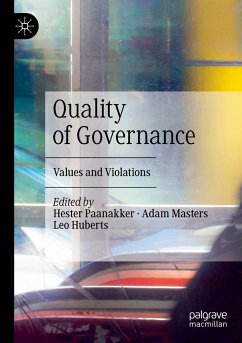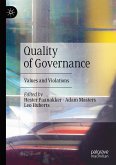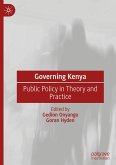"Quality of governance: Values and violations arrives at a time when governance faces new and often dire challenges and as traditional democratic values strain against the rise of authoritarian forms of populism and anti-government sentiment. This comprehensive volume considers these challenges from a variety of angles- transparency, bureaucratic pathologies, public values, sector relations- but at the same time manages a higher degree of integration than one usually finds in most edited volumes. The individual selections focus on topics of widespread interest but with new theories, analytical frameworks and insights. This book should be read by anyone interested the values bases of governance and in exploring good ideas about how to improve policy and management. The book serves a professional academic audience but could also prove quite useful as a text or supplementary book for graduate and undergraduate courses in public affairs."Barry Bozeman, Regents'Professor, Arizona State University, School of Public Affairs, USA.
"Public governance matters. It touches almost every aspect of our lives, from the most mundane to the most important, the most commonplace to the most intimate. This book critically examines some of thorniest values and issues for governance in the 21st century -- democracy, legitimacy, accountability, transparency, integrity, professionalism, and more -- all of which are of crucial importance for practice and research on the quality of governance."Tina Nabatchi, Syracuse University, USA, Co-Chair of the Study Group 'Quality of Governance' of the International Institute of Administrative Sciences.
"This volume provides an up-to-date overview of key themes and theories about the quality of governance. Many of the field's most thoughtful scholars have contributed chapters on both the positive and problematic dimensions of good governance, providing fascinatinginsights in this important topic. Therefore, this book is a must read forall scholars, students, and practitioners interested in improving the quality of governance in their countries and institutions."Zeger van der Wal, National University of Singapore and Leiden University The Netherlands.
This volume unravels the meaning of public values for the quality of governance, for good and bad governance, and examines their significance in governance practices. It addresses public values in context, in different countries, policy sectors and levels of governance. In a series of in-depth studies, a critical eye is cast over eight central values: democratic legitimacy, accountability, transparency, integrity, lawfulness, effectiveness (in terms of service quality), professionalism and craftsmanship, and robustness. How does for instance integrity or lawfulness contribute to the accomplishment and preservation of quality, and what happens if we fail to address it adequately? This unique exercise yields important lessons on the differences in normative interpretation and application of often abstract values in the demanding administrative settings of today. Practitioners, scholars and students of public administration, public management and political science will find the volume a vital resource for theory and practice.
"Public governance matters. It touches almost every aspect of our lives, from the most mundane to the most important, the most commonplace to the most intimate. This book critically examines some of thorniest values and issues for governance in the 21st century -- democracy, legitimacy, accountability, transparency, integrity, professionalism, and more -- all of which are of crucial importance for practice and research on the quality of governance."Tina Nabatchi, Syracuse University, USA, Co-Chair of the Study Group 'Quality of Governance' of the International Institute of Administrative Sciences.
"This volume provides an up-to-date overview of key themes and theories about the quality of governance. Many of the field's most thoughtful scholars have contributed chapters on both the positive and problematic dimensions of good governance, providing fascinatinginsights in this important topic. Therefore, this book is a must read forall scholars, students, and practitioners interested in improving the quality of governance in their countries and institutions."Zeger van der Wal, National University of Singapore and Leiden University The Netherlands.
This volume unravels the meaning of public values for the quality of governance, for good and bad governance, and examines their significance in governance practices. It addresses public values in context, in different countries, policy sectors and levels of governance. In a series of in-depth studies, a critical eye is cast over eight central values: democratic legitimacy, accountability, transparency, integrity, lawfulness, effectiveness (in terms of service quality), professionalism and craftsmanship, and robustness. How does for instance integrity or lawfulness contribute to the accomplishment and preservation of quality, and what happens if we fail to address it adequately? This unique exercise yields important lessons on the differences in normative interpretation and application of often abstract values in the demanding administrative settings of today. Practitioners, scholars and students of public administration, public management and political science will find the volume a vital resource for theory and practice.








